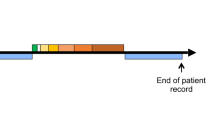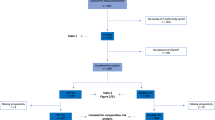Abstract
Patients with rheumatoid arthritis (RA) are at increased risk of infection compared with the general population. As new DMARDs, in particular biologic agents, become more widely prescribed for the treatment of RA, adverse events that were not previously identified in randomized, controlled trials might develop, including opportunistic and serious infections. Understanding the strengths and weaknesses of data derived from randomized clinical trials, registries and meta-analyses is necessary to interpret the results of these studies. Whereas the risk of infection might be increased for the majority of biologic agents that have been approved for use in RA, differences between these agents might affect patients' susceptibility to specific types of infection, immunocompetence and relative risk of infection.
This is a preview of subscription content, access via your institution
Access options
Subscribe to this journal
Receive 12 print issues and online access
$209.00 per year
only $17.42 per issue
Buy this article
- Purchase on Springer Link
- Instant access to full article PDF
Prices may be subject to local taxes which are calculated during checkout
Similar content being viewed by others
References
Baum, J. Infection in rheumatoid arthritis. Arthritis Rheum. 14, 135–137 (1971).
Doran, M. F., Crowson, C. S., Pond, G. R., O'Fallon, W. M. & Gabriel, S. E. Frequency of infection in patients with rheumatoid arthritis compared with controls: a population-based study. Arthritis Rheum. 46, 2287–2293 (2002).
Murphy, K., Travers, P. & Walport, M. Janeway's Immunobiology, 7th edn (Garland Publishing, New York, 2008).
Johns, D. G. & Webb, R. C. TNF-α-induced endothelium-independent vasodilation: a role for phospholipase A2-dependent ceramide signaling. Am. J. Physiol. 275, H1592–H1598 (1998).
Bongartz, T. et al. Anti-TNF antibody therapy in rheumatoid arthritis and the risk of serious infections and malignancies: systematic review and meta-analysis of rare harmful effects in randomized controlled trials. JAMA 295, 2275–2285 (2006).
Furst, D. E. The risk of infections with biologic therapies for rheumatoid arthritis. Semin. Arthritis Rheum. doi:10.1016/j.semarthrit.2008.10.002 (2008).
Askling, J. et al. Time-dependent increase in risk of hospitalisation with infection among Swedish RA patients treated with TNF antagonists. Ann. Rheum. Dis. 66, 1339–1344 (2007).
Dixon, W. G. et al. Serious infection following anti-tumor necrosis factor α therapy in patients with rheumatoid arthritis: lessons from interpreting data from observational studies. Arthritis Rheum. 56, 2896–2904 (2007).
Dixon, W. G. et al. Rates of serious infection, including site-specific and bacterial intracellular infection, in rheumatoid arthritis patients receiving anti-tumor necrosis factor therapy: results from the British Society for Rheumatology Biologics Register. Arthritis Rheum. 54, 2368–2376 (2006).
Leombruno, J. P., Einarson, T. R. & Keystone, E. C. The safety of anti-tumor necrosis factor treatments in rheumatoid arthritis: meta and exposure adjusted pooled analyses of serious adverse events. Ann. Rheum. Dis. doi:10.1136/ard.2008.091025 (2008).
Fleischmann, R. M. et al. Safety of extended treatment with anakinra in patients with rheumatoid arthritis. Ann. Rheum. Dis. 65, 1006–1012 (2006).
Schiff, M. H. et al. The safety of anakinra in high-risk patients with active rheumatoid arthritis: six-month observations of patients with comorbid conditions. Arthritis Rheum. 50, 1752–1760 (2004).
Salliot, C., Dougados, M. & Gossec, L. Risk of serious infections during rituximab, abatacept and anakinra treatments for rheumatoid arthritis: meta-analyses of randomised placebo-controlled trials. Ann. Rheum. Dis. 68, 25–32 (2009).
Genovese, M. C. et al. Combination therapy with etanercept and anakinra in the treatment of patients with rheumatoid arthritis who have been treated unsuccessfully with methotrexate. Arthritis Rheum. 50, 1412–1419 (2004).
Kremer, J. M. et al. Treatment of rheumatoid arthritis by selective inhibition of T-cell activation with fusion protein CTLA4Ig. N. Engl. J. Med. 349, 1907–1915 (2003).
Weinblatt, M. et al. Selective costimulation modulation using abatacept in patients with active rheumatoid arthritis while receiving etanercept: a randomised clinical trial. Ann. Rheum. Dis. 66, 228–234 (2007).
Emery, P. et al. The efficacy and safety of rituximab in patients with active rheumatoid arthritis despite methotrexate treatment: results of a phase IIB randomized, double-blind, placebo-controlled, dose-ranging trial. Arthritis Rheum. 54, 1390–1400 (2006).
Keystone, E. et al. Safety and efficacy of additional courses of rituximab in patients with active rheumatoid arthritis: an open-label extension analysis. Arthritis Rheum. 56, 3896–3908 (2007).
Wolfe, F., Michaud, K., Anderson, J. & Urbansky, K. Tuberculosis infection in patients with rheumatoid arthritis and the effect of infliximab therapy. Arthritis Rheum. 50, 372–379 (2004).
Gómez-Reino, J. J., Carmona, L. & Angel Descalzo, M. Risk of tuberculosis in patients treated with tumor necrosis factor antagonists due to incomplete prevention of reactivation of latent infection. Arthritis Rheum. 57, 756–761 (2007).
Saag, K. G. et al. American College of Rheumatology 2008 recommendations for the use of nonbiologic and biologic disease-modifying antirheumatic drugs in rheumatoid arthritis. Arthritis Rheum. 59, 762–784 (2008).
Fomin, I. et al. Vaccination against influenza in rheumatoid arthritis: the effect of disease modifying drugs, including TNF α blockers. Ann. Rheum. Dis. 65, 191–194 (2006).
Kapetanovic, M. C., Saxne, T., Nilsson, J. A. & Geborek, P. Influenza vaccination as model for testing immune modulation induced by anti-TNF and methotrexate therapy in rheumatoid arthritis patients. Rheumatology (Oxf.) 46, 608–611 (2007).
Kapetanovic, M. C. et al. Influence of methotrexate, TNF blockers and prednisolone on antibody responses to pneumococcal polysaccharide vaccine in patients with rheumatoid arthritis. Rheumatology (Oxf.) 45, 106–111 (2006).
Oren, S. et al. Vaccination against influenza in patients with rheumatoid arthritis: the effect of rituximab on the humoral response. Ann. Rheum. Dis. 67, 937–941 (2008).
Acknowledgements
Dr. Greenberg's work has been supported by the NIH (K23AR054412) and the Arthritis Foundation (Clinical Translational Research Award in Rheumatoid Arthritis).
Author information
Authors and Affiliations
Corresponding author
Ethics declarations
Competing interests
J. D. Greenberg has acted as a consultant for Corrona, UCB, Roche, Genentech and Centocor, and has acted as a consultant and received grant and/or research support from Bristol Myers Squibb. M. C. Fisher declared no competing interests.
Rights and permissions
About this article
Cite this article
Fisher, M., Greenberg, J. Assessing infection risk with biologic agents in RA: methodological challenges. Nat Rev Rheumatol 5, 288–291 (2009). https://doi.org/10.1038/nrrheum.2009.51
Issue Date:
DOI: https://doi.org/10.1038/nrrheum.2009.51



